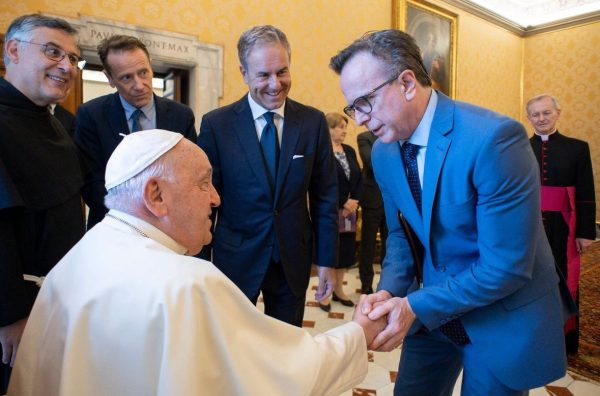Georgetown’s Global Health Institute (GHI) announced its collaboration with Pope Francis’s Global Alliance for Children’s Health Sept. 24.
Pope Francis’s initiative, called the Pope’s Global Alliance for the Health and Humanitarian Care of Children, will work with Georgetown and other partners to create a worldwide network of hospitals aimed at reaching children who would otherwise lack access to necessary medical care. The pope announced the initiative at a meeting attended by Dr. Norman J. Beauchamp Jr., the executive vice president for health sciences at Georgetown University Medical Center (GUMC); Deus Bazira, the GHI director; and Michael Donnelly, chair of the GUMC department of pediatrics, on Sept. 19.
Beauchamp Jr. said in a press release that GHI and Georgetown are dedicated to improving pediatric health care across the world.
“There are so many children who are suffering in silence, and many organizations who are positioned to bring hope and healing to them,” Beauchamp said in the press release. “Georgetown has a recognized expertise in building in-country capacity. It’s creating this sustainability that will ensure access to best care today and into the future.”

In the past, GHI has focused on providing sustainable health care worldwide, such as conducting research and engaging in projects to help with maternal and child health care outcomes.
GHI is working with the Patrons of the World Children’s Hospital, a U.S. non-profit with extensive global experience in the “hub-and-spoke” model, in which a central organization helps multiple smaller organizations that will be implemented in the pope’s initiative. The non-profit’s specific role would be to identify collaboration partners and “spokes” with whom the initiative could connect.
Bazira said in a press release that Georgetown’s primary role in the collaboration is providing logistical and technical support.
“We’ll share best practices for how to enhance the pediatric care delivery ecosystem so that participating hospitals from different regions of the world are best positioned to plan, receive and provide comprehensive care to children wherever they may be,” Bazira said in the press release.
“We know from experience and evidence that these types of networks are strongest and most successful when they are community-centered and communities lead in identifying their needs and how best we can support them,” Bazira added.
Anjali Lauwers (MSB ’27) said initiatives like these can serve as inspiration to students, especially to students who have not seen business or operations concepts applied outside the general context of firms and standard career paths.
“Not only does this initiative exemplify many of the core Jesuit values, it also demonstrates how the concepts learned in business can be leveraged in other domains such as medicine in order to build strong organizations with the resources to make change,” Lauwers told The Hoya.
“I think that seeing this practical application of core topics taught at Georgetown will be invaluable for many students and will hopefully give some individuals a new sense of what they want to do with their careers moving forward,” Lauwers said.
Lauwers said that Georgetown’s resources and Jesuit identity make it uniquely suited to initiatives like the GHI collaboration.
“As a student, I think it is very important that Georgetown engages in global healthcare efforts because the university possesses a wealth of knowledge and resources that could positively contribute to these efforts,” Lauwers said. “Additionally, our global standing as a university makes us uniquely well positioned to engage in such efforts, and our status as a Jesuit school makes it quite important to commit to serving others.”